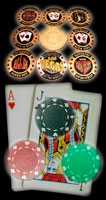CHARACTERISTICS OF THE GAME
Tight Games
Tight games are high-card games. Drawing hands such as suited cards, connected cards, or small pairs don’t have much added value in a tight game.
Two large cards, middle pocket pairs, and large pocket pairs have strong intrinsic value in a tight game. They can often win unimproved.
Loose Games
Loose games add value to a lot of different hand types.
Suited cards, connected cards, and small pairs all have strong drawing value in a loose game.
High cards have increased value also, even hands with only a single high card.
Because in a loose game your occonents are often playing hands such as K ![]() 4
4 ![]() , a hand such as
K
, a hand such as
K ![]() 9
9 ![]() has much more high-card value than it would in a tight game.
has much more high-card value than it would in a tight game.
There is a popular misconception that unsuited hands go down in value in a loose poker game.
This just isn’t true. All hands gain value when your opponents are making mistakes.
Suited hands do tend to gain more value than unsuited hands in loose games, but that does not mean that unsuited cards lose value.
Passive Games
A passive game usually means calling stations.
These kinds of games tend to add value to high cards if the game is also loose because you will tend to be called by weaker hands when the game is loose, and won’t be raised by stronger hands when the game is passive.
Marginal draws also tend to be worth more in passive games because you will often be able to draw for free and will be called if you bet when the draw is made.
Aggressive Games
Aggressive games add value to very strong draws. This is concept that is often not well understood.
Pre-flop raises cut down on the implied odds of draws, but raises on the flop add value to good draws.
Depending on how many outs your draw has and the number of callers on the flop, it’s often a winning play to bet or raise for value with draws.
Aggressive games make this easy to do.
The looser the game is, the more draws that will profit from aggressive opponents, but even in a tight game, some draws profit from raises.
For example, a flush draw with two overcards is a favorite against the top pair if neither of the overcards will make the top pair into two pair.
Pick the Right Table / Picking a Seat / Theories of Poker / Betting Theory: The Odds
A Theory of Starting Hand Value
A Theory of Flop Play: Counting Outs and Evaluating Draws
The Dynamics of Game Conditions / Table Image / Player Stereotypes
Women and Poker / Spread-Limit Games / Double Bet on the End Games / Kill Games
Short-handed Games / Tournaments / No-limit and Pot-Limit Poker



